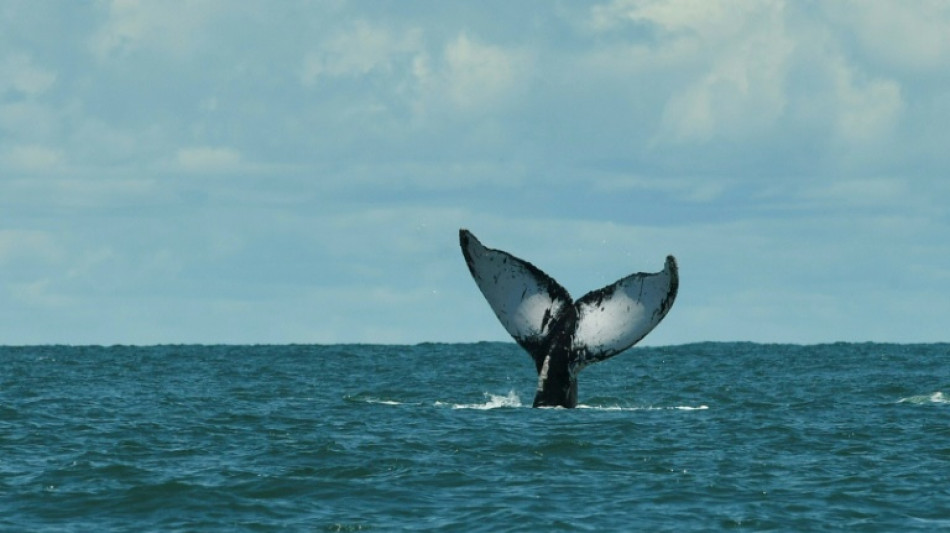
-
 Australia coach Schmidt still positive about Lions after Scotland loss
Australia coach Schmidt still positive about Lions after Scotland loss
-
Man Utd 'confused' and 'afraid' as Ipswich hold Amorim to debut draw

-
 Sinner completes year to remember as Italy retain Davis Cup
Sinner completes year to remember as Italy retain Davis Cup
-
Climate finance's 'new era' shows new political realities

-
 Lukaku keeps Napoli top of Serie A with Roma winner
Lukaku keeps Napoli top of Serie A with Roma winner
-
Man Utd held by Ipswich in Amorim's first match in charge

-
 'Gladiator II', 'Wicked' battle for N. American box office honors
'Gladiator II', 'Wicked' battle for N. American box office honors
-
England thrash Japan 59-14 to snap five-match losing streak

-
 S.Africa's Breyten Breytenbach, writer and anti-apartheid activist
S.Africa's Breyten Breytenbach, writer and anti-apartheid activist
-
Concern as climate talks stalls on fossil fuels pledge

-
 Breyten Breytenbach, writer who challenged apartheid, dies at 85
Breyten Breytenbach, writer who challenged apartheid, dies at 85
-
Tuipulotu try helps Scotland end Australia's bid for Grand Slam

-
 Truce called after 82 killed in Pakistan sectarian clashes
Truce called after 82 killed in Pakistan sectarian clashes
-
Salah wants Liverpool to pile on misery for Man City after sinking Saints

-
 Berrettini takes Italy to brink of Davis Cup defence
Berrettini takes Italy to brink of Davis Cup defence
-
Lille condemn Sampaoli to defeat on Rennes debut

-
 Basel backs splashing the bucks to host Eurovision
Basel backs splashing the bucks to host Eurovision
-
Leicester sack manager Steve Cooper

-
 IPL auction records tumble as Pant, Iyer break $3 mn mark
IPL auction records tumble as Pant, Iyer break $3 mn mark
-
Salah sends Liverpool eight points clear after Southampton scare

-
 Key Trump pick calls for end to escalation in Ukraine
Key Trump pick calls for end to escalation in Ukraine
-
Tuipulotu try helps Scotland end Australia's bid for a Grand Slam

-
 Davis Cup organisers hit back at critics of Nadal retirement ceremony
Davis Cup organisers hit back at critics of Nadal retirement ceremony
-
Noel in a 'league of his own' as he wins Gurgl slalom

-
 A dip or deeper decline? Guardiola seeks response to Man City slump
A dip or deeper decline? Guardiola seeks response to Man City slump
-
Germany goes nuts for viral pistachio chocolate

-
 EU urges immediate halt to Israel-Hezbollah war
EU urges immediate halt to Israel-Hezbollah war
-
Far right targets breakthrough in Romania presidential vote

-
 Basel votes to stump up bucks to host Eurovision
Basel votes to stump up bucks to host Eurovision
-
Ukraine shows fragments of new Russian missile after 'Oreshnik' strike

-
 IPL auction records tumble as Pant and Iyer snapped up
IPL auction records tumble as Pant and Iyer snapped up
-
Six face trial in Paris for blackmailing Paul Pogba

-
 Olympic champion An wins China crown in style
Olympic champion An wins China crown in style
-
It's party time for Las Vegas victor Russell on 'dream weekend'

-
 Former Masters champion Reed seals dominant Hong Kong Open win
Former Masters champion Reed seals dominant Hong Kong Open win
-
Norris applauds 'deserved' champion Verstappen

-
 Jaiswal and Kohli slam centuries as Australia stare at defeat
Jaiswal and Kohli slam centuries as Australia stare at defeat
-
Kohli blasts century as India declare against Australia

-
 Verstappen 'never thought' he'd win four world titles
Verstappen 'never thought' he'd win four world titles
-
Former Masters champion Reed wins Hong Kong Open

-
 Awesome foursomes: Formula One's exclusive club of four-time world champions
Awesome foursomes: Formula One's exclusive club of four-time world champions
-
Smylie beats 'idol' Cameron Smith to win Australian PGA Championship

-
 Five key races in Max Verstappen's 2024 title season
Five key races in Max Verstappen's 2024 title season
-
Max Verstappen: Young, gifted and single-minded four-time F1 champion

-
 'Star is born': From homeless to Test hero for India's Jaiswal
'Star is born': From homeless to Test hero for India's Jaiswal
-
Verstappen wins fourth consecutive Formula One world title

-
 Survivors, sniffing dogs join anti-mine march at Cambodia's Angkor Wat
Survivors, sniffing dogs join anti-mine march at Cambodia's Angkor Wat
-
Far right eye breakthrough in Romania presidential vote

-
 Jaiswal slams majestic 161 but Australia fight back in Perth
Jaiswal slams majestic 161 but Australia fight back in Perth
-
Edinburgh's alternative tour guides show 'more real' side of city


Protecting 30 percent of oceans a huge challenge for the planet
How do we go from protecting eight percent of marine areas to 30 percent in less than 10 years? This question is at the heart of a global forum in Canada this weekend aiming to save marine ecosystems under threat from overfishing, pollution and climate change.
On the heels of the historic biodiversity agreement signed at COP15 in Montreal late last year, about 3,000 officials, scientists, NGOs and Indigenous groups are meeting in Vancouver for the fifth International Marine Protected Areas Congress (IMPAC5), which opened Friday and runs until February 9.
Scientists have said the meeting is crucial for setting up a framework to reach the agreed target at COP15 of protecting 30 percent of the planet's lands and oceans by 2030.
It's an immense step for ocean conservation, which will see a tripling of areas made off-limits to most human activities, with an aim to preserve sensitive ecosystems and species at risk.
The summit, usually held every four years, is taking place two years late due to the Covid-19 pandemic.
"We must re-think our policies, economies, priorities, and processes in ways that reflect the important role nature plays in our own health, equity, well-being and economic sustainability," said host Canada, which has some of the world's longest coastlines.
Covering almost three-quarters of the earth's surface, oceans are home to a quarter of known species and absorb 30 percent of CO2 emissions from human activities.
"COP15 marked a historic inflection point in conservation efforts for nature... but the pressure is on now not just to reach the numerical target, but to make sure that we do it right, that our marine protected areas are in the right places (and) that they're managed well," Pepe Clarke of the World Wide Fund For Nature (WWF) told AFP.
Some experts fear the "politics of figures."
- Resistance to climate change -
Biodiversity hotspots or particularly vulnerable areas that deserve urgent conservation measures have been identified, scientists have said.
Now it is essential to have discussions to "establish a global network, ecologically representative and which adequately protects the whole range of ecosystem types," according to Clarke.
Especially since protecting and managing our oceans more sustainably will make them more resistant to climate change.
But even if the world achieves "the ambitious target of protecting 30 percent of the oceans by 2030 within high-quality (marine protected areas), the goals of the framework cannot be fully met without appropriate management of the other 70 percent of the oceans," said the Pew Charitable Trusts, a non-profit.
For Sian Owen, director of the Deep Sea Conservation Coalition (DSCC), "it is crucial that both existing and emerging industries that threaten our deep ocean are quickly and unequivocally rejected and that we sustainably manage the remaining 70 percent."
UN member states will meet again at the end of February to try and hammer out a treaty for the protection of the high seas, a session that should in principle be the last.
Protecting international waters, which cover nearly half the planet, is crucial for the health of the entire ocean and its biodiversity, and for limiting global warming.
"Governments must restrict activities that destroy and disturb vital ecosystems that support life on Earth," said DSCC.
K.Brown--BTB



